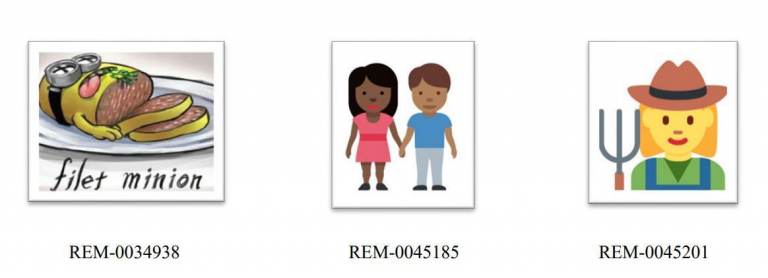Asked for documents in Sandy Hook shooting, a gun-maker sent thousands of cartoons

Among the documents produced by Remington Arms Co. were more than 18,000 files depicting emoji, cartoons and other images including one of a Despicable Me minion sliced like steak with the caption "filet minion," according to a court filing by lawyers representing 10 Sandy Hook families in a lawsuit against the company. (Screenshot by NPR)
Lawyers representing 10 Sandy Hook families in a lawsuit against Remington Arms Co. have accused the gun-maker of deliberately slowing the discovery process by filing tens of thousands of seemingly unrelated images and videos.
Among the documents produced by Remington were more than 18,000 files depicting cartoons and emoji, along with thousands of seemingly personal photos and videos of people participating in activities such as go-karting, hunting and gender reveal parties, according to a court filing last week. Meanwhile, it says, the company has been too slow to turn over relevant emails and other company documents.
“Remington has treated discovery like a game,” the complaint reads. “Unwilling to have this case decided by a jury on the merits with a full record, Remington has sought delay and obfuscation at every turn.”
Sources associated with Remington say the images and videos were filed in response to a specific request the plaintiffs made to turn over all material from the company’s various social media pages, an explanation the families’ lead attorney dismissed in an interview with NPR.
The lawsuit is looking at how Remington marketed the rifle used at Sandy Hook
At the heart of the lawsuit are questions about how Remington marketed and advertised the model of AR-15-style rifle that was used in the Sandy Hook Elementary School shooting that killed 26 people in 2012 in Newtown, Conn.
As part of the discovery process, lawyers representing 10 Sandy Hook families requested a wide variety of documents from Remington, including marketing materials and drafts, emails sent to and from marketing employees, and materials from social media pages operated by Remington and its associated brands.
In response, Remington filed thousands of documents including company emails, product catalogs and advertisements. But at issue in the new complaint are the thousands of seemingly unrelated files, which include emoji of Santa Claus, ice cream and weightlifting; videos of go-karting and people doing the ice bucket challenge; and a cartoon of a Despicable Me minion sliced like steak with the caption “filet minion.”
“It’s not at all clear to us what this information is doing in this disclosure, other than it’s some type of an effort to perpetrate a document dump where they give you a bunch of stuff you didn’t ask for and withhold relevant information that you did ask for,” said Josh Koskoff, the lead attorney representing the 10 families.
Both sides debate why the images were produced in court documents
Sources associated with Remington, who spoke to NPR on condition of anonymity because they had not been authorized to speak to the media, said the images and videos were produced because they had appeared on Remington-operated websites and social media pages.
People unaffiliated with Remington could post personal videos and pictures to Remington’s Facebook page, for instance, or leave comments containing emoji, which were then downloaded as individual files, the sources said.
Court documents show the plaintiffs requested that Remington produce any documents related to the company’s marketing and advertising of its AR-type rifles, including “a complete history of their presence on Facebook, Twitter, and Instagram.”
Additionally, plaintiffs requested the files be provided in a way that allowed for full access to user comments, video playback and image metadata. In other words, instead of providing a screenshot of a Facebook video post, plaintiffs asked Remington instead to send the video file itself.
“We request that you produce native versions of all embedded images and videos posted to Defendants’ social media accounts during the relevant period,” the plaintiffs’ legal team requested in a letter last year that was included as an exhibit in a court filing made last week.
Speaking with NPR on Thursday, Koskoff expressed skepticism at that explanation.
“I don’t think this is a result of that request. What Remington has said all along is they will make substantial compliance to our request, the plaintiffs’ request. And they haven’t done anything of the sort,” he said. “This is more an indication of their failure to play by long-standing court rules.”
Remington has also filed some 2,200 unique emails as part of the discovery process, according to the plaintiffs’ complaint. Lawyers for the Sandy Hook families suggested that number was not comprehensive, listing several marketing executives at Remington whose emails had not been furnished.
“It is inconceivable that Remington’s entire marketing department, which … consisted of over 30 employees in 2010 alone, sent a mere 2,194 relevant, non-privileged emails during the seven-year period from 2006 to 2012,” the complaint says.
Sources associated with Remington said the company had already provided emails related to the specific gun model involved in the case and that it did not intend to provide unrelated emails.
A trial could begin in September
The plaintiffs’ motion requests that the court set an Aug. 1 deadline for Remington to produce any remaining documentation.
A response from Remington is expected in the coming weeks. The company has repeatedly maintained in multiple court filings that its document production is already “substantially complete,” though discovery is still ongoing.
The lawsuit was originally filed in 2014 but has been delayed by various legal proceedings and two Remington bankruptcies. The case has repeatedly moved to federal court and back, most recently when the U.S. Supreme Court declined to hear the case in 2019, sending it back to Connecticut’s high court. Remington’s latest bankruptcy had resulted in an automatic one-year stay of the proceedings.
That stay was lifted in June, allowing the case to proceed. Jury selection is currently scheduled for September.
9(MDAzMzI1ODY3MDEyMzkzOTE3NjIxNDg3MQ001))




